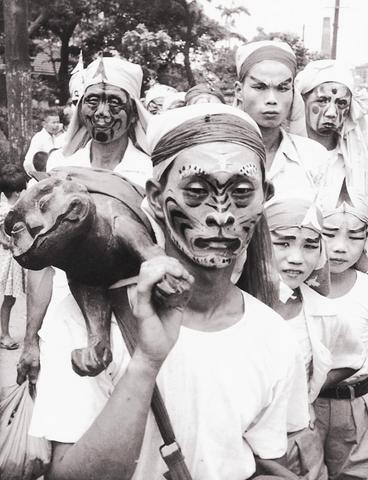"I am not highly educated. I just use my camera to observe people and things. It doesn't have to appear `artistic,'" was Chang Tsai's (張
The 71 works in Classic Chang Tsai -- the Unreleased Photos, (遺

PHOTO COURTESY OF TIVAC
A series of photos of egrets taken in Taipei's Guandu at sunset are the most beautiful works in the exhibition. According to Chang Tsai's son, the two set out from their home before every sunset and rode to the water front with their Leica and several makeshift lenses, which were unsuited for wildlife photography, and spent a good few hours patiently waiting for their subjects.
Chang always captured them in their most serene and confident posture against a background of amazingly geometrical tree branches. These small-format prints have acquired a sense of mystique over time, as flood water and moisture made white marks on the paper that look like passing clouds or reflections on rivers.
Tao Aborigines on Orchid Island are the subjects of another enduring series taken in the 1940s. At a time well before the commercialization of their pristine environment, Tao men and women let Chang record their daily life and take their portraits, sometimes in exchange for just a few Taiwan-made cigarettes. They look diligent yet contented with their lifestyle. A photo of a lone Tao man carrying a small pot of drinking water to his shed implies the Tao's easy-going attitude to life that is worlds away from the current tourism-driven islands.
Chang was one of the first generation of Taiwanese photographers with an academic background. At 18, Chang went to Tokyo to study photo portraiture. Five years later, he opened his photo studio in Taipei. In 1942, Chang and his newly-formed family went to do business in Shanghai. Chang's photgraphy career did not really take off until he returned to Taipei with his first solo exhibition in what is now Zhongshan Hall in Taipei. Since then, Chang has organized exhibitions and published photography journals in Taiwan and exhibited abroad.
His series of portraits of Tao Aborigines near Jade Mountain remains the highest-acclaimed. One of Chang's favorites from the series -- the imperturbable and dignified face of a Tao prince -- is also on show.
Classic Chang Tsai -- the Unreleased Photo Works, runs through Feb. 18 at Taiwan International Visual Arts Center, 29, Ln 45, Liaoning St, Taipei. (台

Taiwan has next to no political engagement in Myanmar, either with the ruling military junta nor the dozens of armed groups who’ve in the last five years taken over around two-thirds of the nation’s territory in a sprawling, patchwork civil war. But early last month, the leader of one relatively minor Burmese revolutionary faction, General Nerdah Bomya, who is also an alleged war criminal, made a low key visit to Taipei, where he met with a member of President William Lai’s (賴清德) staff, a retired Taiwanese military official and several academics. “I feel like Taiwan is a good example of

March 2 to March 8 Gunfire rang out along the shore of the frontline island of Lieyu (烈嶼) on a foggy afternoon on March 7, 1987. By the time it was over, about 20 unarmed Vietnamese refugees — men, women, elderly and children — were dead. They were hastily buried, followed by decades of silence. Months later, opposition politicians and journalists tried to uncover what had happened, but conflicting accounts only deepened the confusion. One version suggested that government troops had mistakenly killed their own operatives attempting to return home from Vietnam. The military maintained that the

Jacques Poissant’s suffering stopped the day he asked his daughter if it would be “cowardly to ask to be helped to die.” The retired Canadian insurance adviser was 93, and “was wasting away” after a long battle with prostate cancer. “He no longer had any zest for life,” Josee Poissant said. Last year her mother made the same choice at 96 when she realized she would not be getting out of hospital. She died surrounded by her children and their partners listening to the music she loved. “She was at peace. She sang until she went to sleep.” Josee Poissant remembers it as a beautiful

Before the last section of the round-the-island railway was electrified, one old blue train still chugged back and forth between Pingtung County’s Fangliao (枋寮) and Taitung (台東) stations once a day. It was so slow, was so hot (it had no air conditioning) and covered such a short distance, that the low fare still failed to attract many riders. This relic of the past was finally retired when the South Link Line was fully electrified on Dec. 23, 2020. A wave of nostalgia surrounded the termination of the Ordinary Train service, as these train carriages had been in use for decades